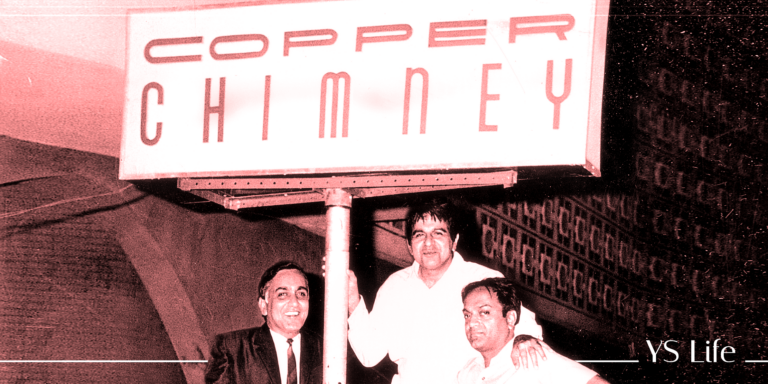
Walk into Copper Chimney and you almost imagine yourself somewhere away in an old city with its ornate architecture–beautiful monuments, minarets, havelis and timeless streets, and the hiss and sizzle of aromas that greet every passer-by.
For this restaurant is all northwest about frontier province-inspired fare. Expect to be transported into the cities of old Delhi, Lahore, and Bombay as you dine here, for this restaurant stokes up the rich culinary legacy of the past with its food.
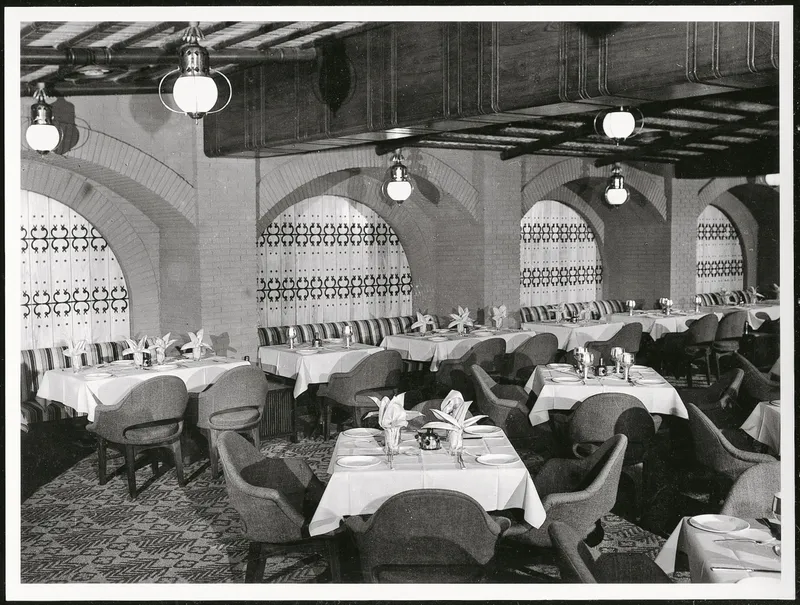
How it was then – the interiors of Copper Chimney in 1972
Back in the day, it welcomed folks with a lavish spread laden with dry fruits, rich kormas, and kebabs at a time when fancy dining rooms were still new to the city. And now, 50 years later, Copper Chimney in Worli, Mumbai, is bringing back the dishes that it started out with.
YS Life checked out why CC is worth the déjà vu, not just with the old-timers who’ve seen this place grow, but food lovers of any age, including those new to the city.
One man’s dream
The restaurant is unmissable at Worli on the last block of buildings facing the sea. This is the flagship restaurant for Copper Chimney, once being the toast of the town. It has hosted some of the most well-known names–from Dev Anand to Dilip Kumar, Saira Banu, and Waheeda Rahman.
Back then, the décor may have been different, but it was still about hearty food prepared with treasured recipes.
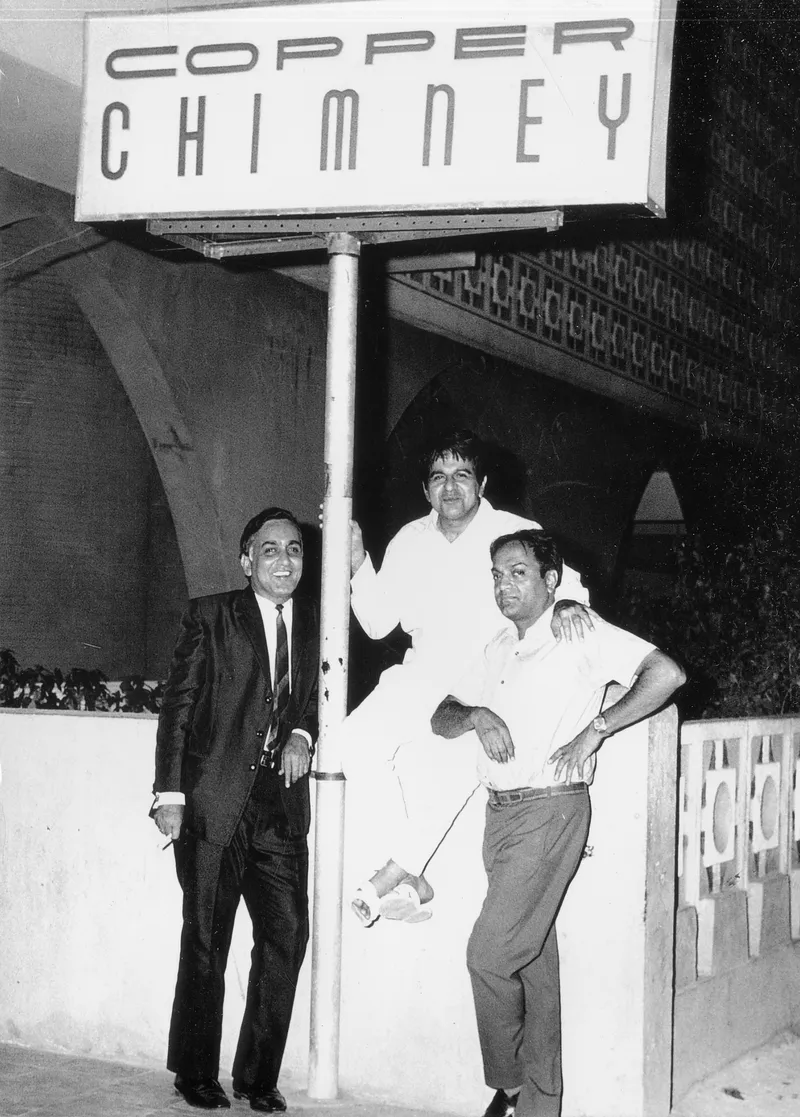
Late Dilip Kumar with Mr Prem Chadda (L) and Mr JK Kapur (R)
In the present day, many folks have their special memories here–whether it is birthday celebrations, family lunches, or festive dinners. Yet, the recipe for Copper Chimney’s success goes back decades ago to its founder JK Kapur, who personified the refugee success story–a man who arrived into India from Lahore in 1947 post the partition, with just a few essentials in hand and memories of the flavours he grew up with, especially his mother’s recipes. Behind that was his dream to someday own his own eatery.
As destiny would have it, he first began to work as a film distributor, delving into the world of tin seldom. But through that time, JK kept his dream alive. The leap happened when he opened a small restaurant in partnership with his friend, Prem Chaddha. It soared to success and pushed JK to finally concretise his dream–opening Copper Chimney in 1972. And it was inaugurated by none other than the late Dilip Kumar! To date, the walls of the restaurant are a showcase of the further goodwill and friendships he developed with the famous names who dined here.
Karan Kapur, the third-generation owner and grandson of JK Kapur, doesn’t mince words when he says, “I feel so proud to be part of such a rich culinary history. Today, it is literally an institution. I feel not only humbled, but also conscious of the tremendous legacy and responsibility that goes with it. He taught us to never compromise on quality, to always cook fresh, and of course, to look after our people.”
Some of CC’s oldest staff has been with them for over 40 years now, an indication of how it’s stood the test of time, just like its food.
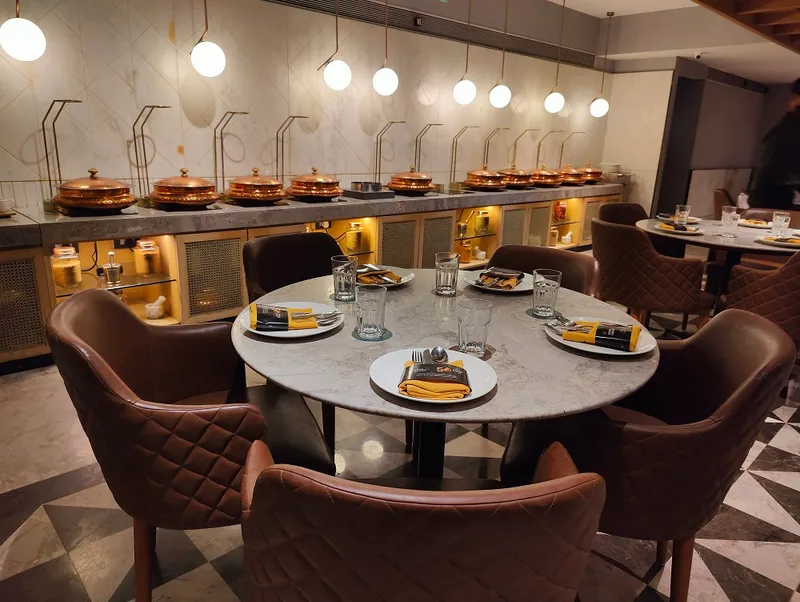
Present day Copper Chimney at Worli
Several firsts
Copper Chimney is also associated with several firsts. For one, it was the first restaurant to have a woman head chef, the first standalone to have a show kitchen for its guests, and to introduce the Iranian Chelo Kabab and Burrah Chops from the Khyber Pakhtunkhwa region to the city.
Karan shares an anecdote. “Back then, my grandfather had put up a sign that said the owners of the restaurant also eat here. Today we may laugh about this, but the idea of putting it there was to just inspire and build trust with people to say, look, the food is of great quality and safe, where the owner and his family eat at this restaurant as well. It was these small things he did at that time in the 70s, which I think was really different and interesting,” he says.
He goes on to narrate how their head chef at that time was a woman, Tari, a move that was quite unheard of in those times. “Today, we talk so much about bringing more women into the restaurant industry and kitchens and my grandfather did that years ago; he was definitely way ahead of his time,” he remarks.
Undivided flavours
From the start, CC stirred up interest in food that people did not know much about back then like the Chelo Rice and the Chelo Kabab, which are the signature dishes at the restaurant. “We have a cult-like following for it,” reveals Karan.
Several reintroduced dishes like their Dal Maharaja, Rawalpindi Gosht, and Chicken Bharta have also found pride of place on Copper Chimney’s limited edition ‘Autograph’ menu. For those who haven’t lived in that era, it’s a slow cooked treat!
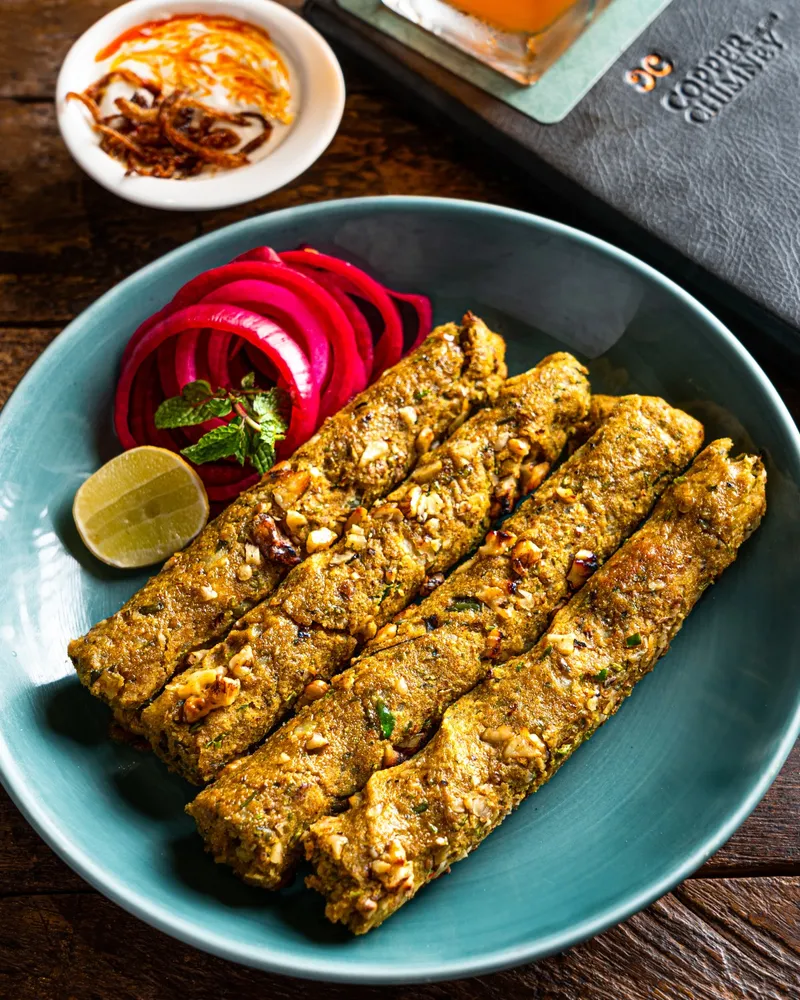
Subz Akhrot ki Seekh
Begin with a Subz Akhrot Seekh, the Kashmiri version of seekh with added walnuts for a little crunch. Karan’s own favourites also include the White Pepper Chicken Chops and the Kadak Roomali.
The Kabuli Naan, inspired by the naanbais or bread makers of Peshawar, is a large round bread garnished with dried fruits and nuts that gives it a slightly sweetish taste. Move to the Paneer Khurchan, a dish that originated in dhabas run by Punjabi immigrants or the Palak Goolar Kofta stuffed with fried Kashmiri figs and covered in varq, an edible silver leaf.
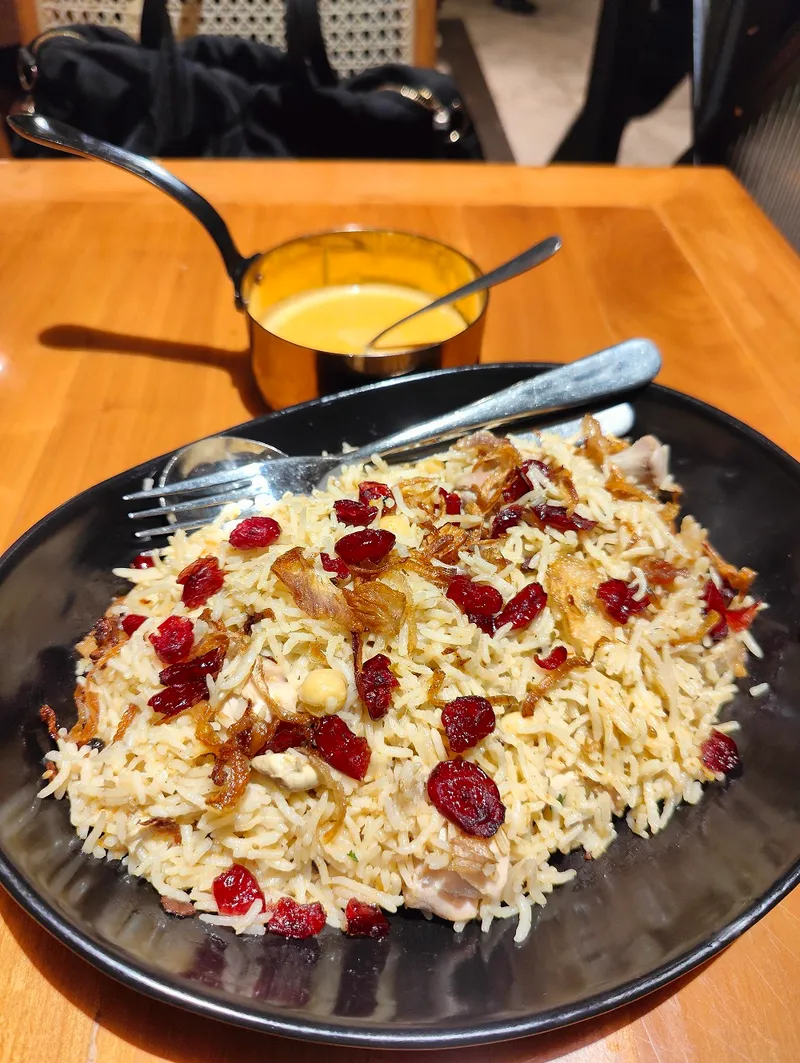
Pashtoni chicken yakhani pulao garnished with afghani red berries
This is robust, rustic northwest frontier-influenced food. Karan elaborates, “I think in a way we say our food’s inspired from the undivided north of India–stretching from northwest frontier Lahore to parts of Delhi, Kashmir, and the whole north. The influences from all these different areas together form the cuisine.”
Slow cooking and specifics play a key role. For instance, they are particular for the paneer to have that certain degree of softness. He further informs how they focus on the smallest details like buying graded spices from certain farms, maintaining ingredients a certain way, adhering to the temperature at which each dish is cooked at and even having some of our equipment custom designed. “It’s all these nitty-gritties that matter,” he sums up.
New-age plans
Karan credits his mother as being the only qualified catering college graduate in their family. As a graduate in economics from Northwestern University, he also holds an MBA from Harvard Business School. He may have a different background, but does that even matter? Because Karan has seen the restaurant business inside out since an early age.
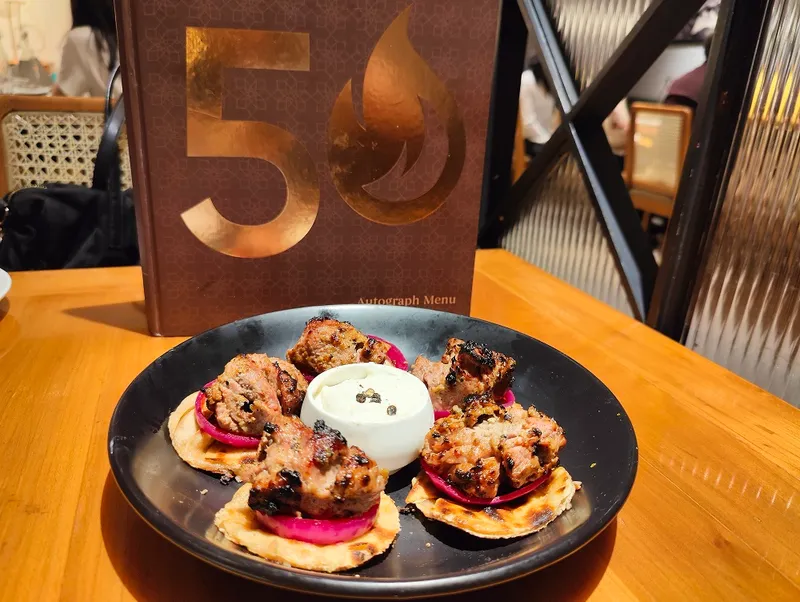
Mutton kalia with boti kabas packs the nomadic flavour of Peshawar
“I’ve grown up understanding all the facets of it–from the food to the people, the operations and so on. I have memories of being in the kitchen and the back. I even remember the keywords that were used to punch orders for the butter chicken and roomali roti, which I used to do when I was just six-years-old,” he laughs.
Over the years, they’ve also adjusted their brand philosophy to suit the new times. “I guess overall, as a group, we have made mistakes and learnt from those over the last 50 years. It’s sure helped hone our focus and consistency,” he admits.
As a young professional, he’s bringing fresh ideas to the table. There are nine Copper Chimney outposts in Mumbai and 15 across India, making for no small feat. And it has plans to go abroad. “We’ve now entered Europe in Westfield Mall, which is one of the busiest malls, so it’s great to see an Indian brand right there standing proud on its strength and placed next to some of the biggest brands like Wagamama and Busaba,” informs Karan.
At a time when the restaurant scene is burgeoning with contemporary flavours and trends like deconstructed fare, it means something to continue to hold out the baton to such a rich legacy of food. If founder JK Kapur were around, you might ask him to take a bow. And then settle down with Muzaffar, the sweet vermicelli-topped rabdi instead, as you end your repast from the past.
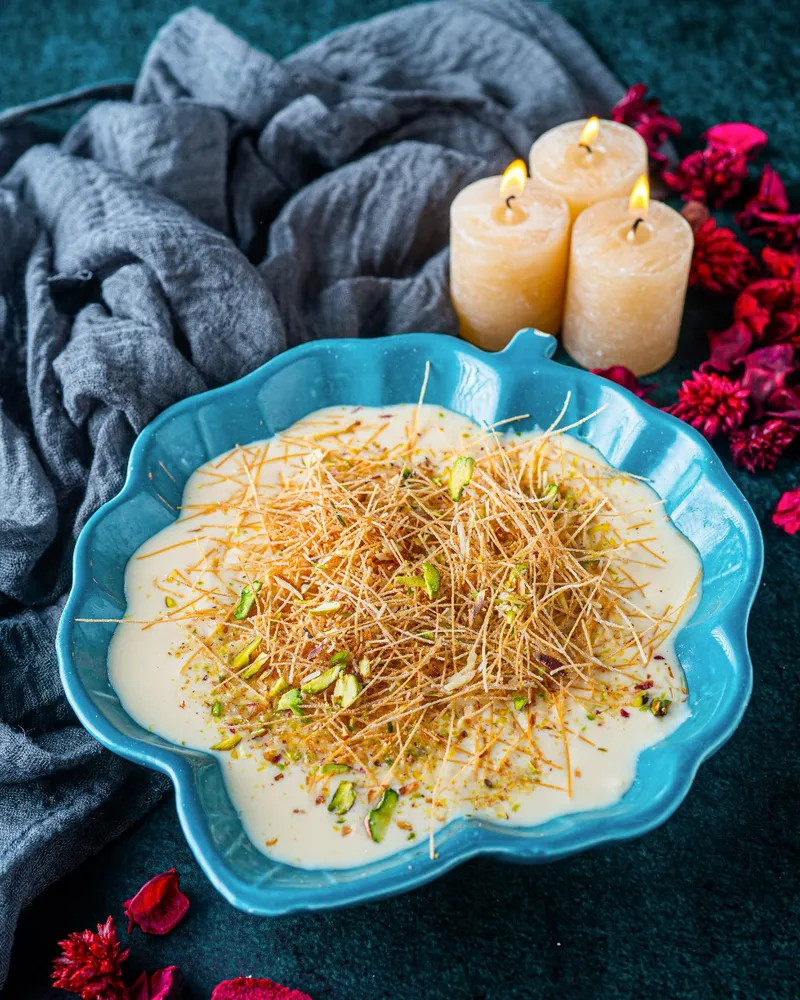
Muzaffar, the indulgent dessert where rabdi is topped with roasted vermicelli